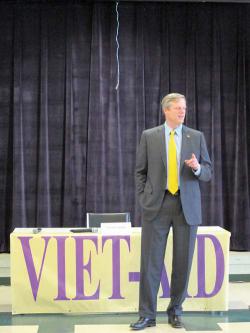April 17, 2014
 On the stump in Fields Corner: Charlie Baker makes a point. Photo courtesy Viet-AIDCharlie Baker is running late. He walks into the Viet-AID community room at 5:53 p.m., 38 minutes after the gubernatorial meet-and-greet was supposed to start, a victim of evening traffic on Dorchester Avenue.
On the stump in Fields Corner: Charlie Baker makes a point. Photo courtesy Viet-AIDCharlie Baker is running late. He walks into the Viet-AID community room at 5:53 p.m., 38 minutes after the gubernatorial meet-and-greet was supposed to start, a victim of evening traffic on Dorchester Avenue.
Thirty people have scattered themselves throughout the room, and as the he makes his way to the podium, he stops to shake hands, making sure to reach out to as many as he can. At six-foot-six, Baker towers over almost everybody there, except for one young man, whom he pulls close and says, tongue-in-cheek, “This guy’s tall.”
It’s a windy Monday night in April and Baker, a Swampscott Republican running for governor, is in Fields Corner. “Mr. Baker, welcome to Viet-AID,” Nam Pham, the Vietnamese-American development organization’s executive director, says in making the introduction to the crowd. “He used to be my boss,” Pham adds, referring to when Pham served as head of the Massachusetts Office of Refugees and Immigrants under Gov. William Weld.
Pham starts to recite Baker’s biography, the long version. The candidate, with a quizzical expression, takes a few steps toward Pham and looks over his shoulder. “See. All good,” Pham says, waving a piece of paper.
“There’s a lot of information in there, Bud,” Baker says. “I don’t know if they need to hear it all.”
Pham edits it down. Harvard degree. Head of the state secretariat of health and human services. CEO of Harvard Pilgrim Health Care.
Baker then adds another biographical detail, a reprise of a line from 2010, when he first ran for governor. He is the product of a “mixed marriage” – his mother a Democrat, his father a Republican. “My parents taught me it was okay to disagree without being disagreeable,” he says.
Baker sticks to three things in his campaign pitch. The economy: It “has been pretty flat in terms of job growth. We’ve got to get to the point where anybody who wants to work in Massachusetts can.” Better schools: “Too many of our kids aren’t getting the education they need.” And creating more “thriving” communities. Fixing those “doesn’t solve all of life’s problems, but for most people, it’s a pretty good start.”
During question time, Baker tells the audience that he supports an increase in the minimum wage, but he wants tax credits for small businesses to absorb the increase without reducing hours or laying people off. He wants more aid to head to cities and towns and for the state to lift the cap on charter schools.
And because he feels the state’s universal health care law was working fine – 98 percent of residents covered and a health care exchange site that actually functioned – until the federal one superseded it, he would attempt to get a waiver for the state from the federal Affordable Care Act, despite Washington’s rejection of Gov. Deval Patrick’s request. “It’s like trying to get a second dessert out of your parents,” Baker says. The answer, the first time, is always no. “So you go back and you ask again.”
Donna Gittens, a Dorchester resident, tells him she’s a “huge fan” of his, adding she knows he’s not like the “very scary” national Republicans in Washington, D.C. But, she asks, what is your position on casinos?
He’s concerned about saturation, he says. “They seem to be heading down the road of doing a bunch of them,” Baker says, referring to the state’s gambling commission. And then there’s potential impact on restaurants and retail shops. “You plop a casino down in the middle of those, what does that do to folks who used to go to the main street businesses?” Baker says. “I don’t know the answer to that.”
Back to the stump speech: His final point, he says, is about balance in government. “There is value in having more than one team on the field,” Baker says. “There is value in making sure you have Republicans to hold Democrats accountable and Democrats to hold Republicans accountable. Right now you have just one party on Beacon Hill…One of the things you get with me is balance, you get checks and balances.”
The argument didn’t work in 2010. Patrick won reelection, taking 48 percent of the vote to Baker’s 44 percent, with Tim Cahill, a Democrat-turned-independent from Quincy, finishing with 8 percent. And Democrats held onto their super-majorities in both houses on Beacon Hill.
In Fields Corner, the Viet-AID community center on Charles Street doubles as a polling location for two Ward 15 precincts where Patrick trounced Baker in 2010, 566 to 73. But Patrick isn’t running again, and five Democrats are enmeshed in a battle to succeed him. Two independents are also looking to earn a place on the ballot.
Baker is carrying himself differently this time around, observers say. The angry candidate of 2010 has given way to the comfortable and goofy wonk his friends say was always there underneath the surface.
As his former boss heads back outside and jumps in the car, Pham echoes Baker’s argument about balance in government. “Where we come from in Vietnam, one party does not provide the best service,” Pham says. “His entry gives some balance, some choices for the people of Massachusetts. And that’s a good thing.”
Villages:
Topics:



